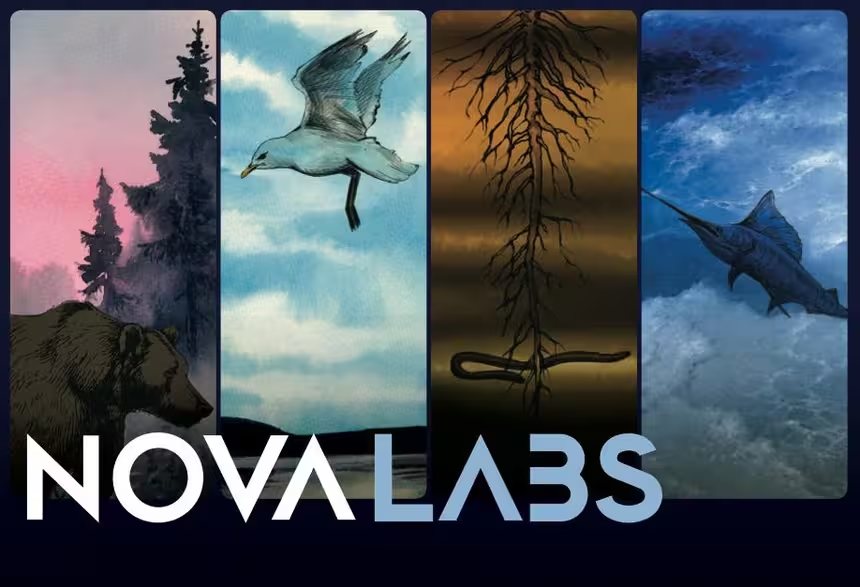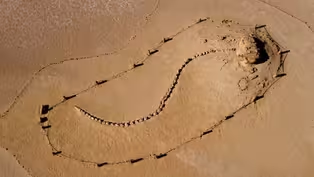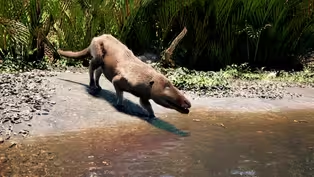
How Did Whales Evolve From Land Mammals?
Clip: Season 51 Episode 1 | 3m 8sVideo has Closed Captions
The story of whales’ evolution from land mammals is hidden in their genes.
The oceans are thought to be where life started but about 50-million years ago, something incredible happened: some mammals found their way back into the water.
Problems playing video? | Closed Captioning Feedback
Problems playing video? | Closed Captioning Feedback
National Corporate funding for NOVA is provided by Carlisle Companies and Viking Cruises. Major funding for NOVA is provided by the NOVA Science Trust and PBS viewers.

How Did Whales Evolve From Land Mammals?
Clip: Season 51 Episode 1 | 3m 8sVideo has Closed Captions
The oceans are thought to be where life started but about 50-million years ago, something incredible happened: some mammals found their way back into the water.
Problems playing video? | Closed Captioning Feedback
How to Watch NOVA
NOVA is available to stream on pbs.org and the free PBS App, available on iPhone, Apple TV, Android TV, Android smartphones, Amazon Fire TV, Amazon Fire Tablet, Roku, Samsung Smart TV, and Vizio.
Buy Now

NOVA Labs
NOVA Labs is a free digital platform that engages teens and lifelong learners in games and interactives that foster authentic scientific exploration. Participants take part in real-world investigations by visualizing, analyzing, and playing with the same data that scientists use.Providing Support for PBS.org
Learn Moreabout PBS online sponsorship- [Narrator] All whales and dolphins have this unexpected feature of multiple stomach chambers.
(gentle music) It's a trait they inherited from their ancient relatives that walked on land.
- [Michael] Just like cows have multiple stomachs to digest their planned matter, whales have multiple stomachs to digest what they're eating, which is completely different fishes and squid, but it's still coming from the same structure as a terrestrial mammal.
- [Narrator] This anatomy is more evidence that whales are related to hoofed mammals, (dramatic music) and this terrestrial heritage can even be revealed in their genes.
(gentle music) In his lab, Michael uses modern whales, DNA, to map their past.
(gentle music) It's opening up a vast new world of information about the origins of whales.
- So if you think about different marine mammals, such as a manatee or a seal sea line, they all swim and live in the ocean and have similar adaptations to whales and dolphins.
But we can look at the DNA to see whether whales and dolphins are closely related to those other groups or whether they're related to another species entirely.
- [Narrator] Scientists wanted to identify the whale's closest living relative, so they compared whale DNA with a range of other animals.
(gentle music) - They came up with a really surprising finding, and the finding was that the whale's closest relative using DNA was the hippo.
(intense music) - [Narrator] Whales and hippos both descended from a common hoofed ancestor that lived about 5 million years before Pakasedas.
- Some of the earliest whales like Pakasedas may have lived like hippos.
(cheerful music) Also, hippos get birthed underwater.
They nurse underwater, their skin is also very thick.
So it's interesting to think that maybe the common ancestor whales and dolphins had these particular features.
(gentle music) - [Narrator] But life in the ocean is very different from life on the riverbank.
Over time, whale's ancestors adapted to this new environment.
(gentle music) Scientists compared the DNA of hippos and whales to find out how.
- Genome of whales.
We see that whales still have a lot of the genes from when they used to live on land.
So they still have genes involved in smelling, sweat glands, color vision, producing saliva.
But these genes are inactivated and they gradually degrade.
But I think this is incredibly powerful evidence that shows that whales come from land ancestors, that they still have these genes in their genomes, even though they're inactivate.
(gentle music)
Ancient whale fossils found in the desert
Video has Closed Captions
Clip: S51 Ep1 | 2m 10s | What is this whale skeleton doing in the Egyptian Sahara Desert? (2m 10s)
This Massive Skeleton Belongs to an Ancient Whale
Video has Closed Captions
Clip: S51 Ep1 | 2m 28s | At first, scientists thought it was a gigantic marine reptile. (2m 28s)
Video has Closed Captions
Clip: S51 Ep1 | 2m 48s | Today’s whales look nothing like their ancient ancestor. (2m 48s)
When Whales Could Walk Preview
Video has Closed Captions
Preview: S51 Ep1 | 30s | Giant fossils uncovered in the Sahara Desert reveal new secrets of how whales evolved. (30s)
Providing Support for PBS.org
Learn Moreabout PBS online sponsorship
- Science and Nature

Capturing the splendor of the natural world, from the African plains to the Antarctic ice.













Support for PBS provided by:
National Corporate funding for NOVA is provided by Carlisle Companies and Viking Cruises. Major funding for NOVA is provided by the NOVA Science Trust and PBS viewers.






